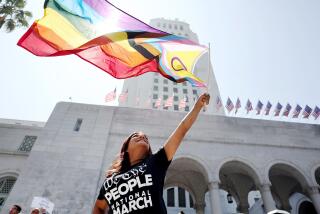Rights Are Not a Numbers Game : Constitutional protections don’t pivot on a group’s population or political clout
- Share via
In what was expected to be one of the nation’s largest civil rights events, gays, lesbians and supporters march today in Washington. This happens to occur on the heels of one of the largest surveys of male sexual behavior ever conducted in the United States. The Alan Guttmacher Institute’s survey found that 1.1% of the 3,321 men interviewed consider themselves exclusively homosexual--a percentage very close to those of some other recent surveys. The Guttmacher study further reported that only 2.3% of American men had had a homosexual experience. The men questioned were 20 to 39 years old, and the survey was described as population-based and nationally representative.
Until recently many had assumed that the homosexual population almost surely was considerably larger, a view derived chiefly from the finding of the pioneering Kinsey Report on male sexual behavior 45 years ago. Alfred Kinsey, whose methodology has long been questioned, estimated that up to 10% of the male population might be homosexual.
The 1.1% figure has been quickly challenged by some. But its approximate recurrence in a number of other studies here and abroad argues against dismissal.
What does all this mean in regard to current debates about the place of homosexuals in American society? It means exactly nothing.
Whether homosexuals are 1% of the population or 10% or some figure in between, they are beyond any argument or cavil 100% entitled to the same protection under the law and the enjoyment of the same rights that everyone else is guaranteed. That specifically includes the right to be free from discrimination and intimidation in employment, housing and schooling. It means the right to be protected from hate-inspired physical assaults. It means the right to privacy as that right applies to everyone else.
No American’s rights are contingent on the size of the group with which he or she identifies or is identified. Rights are not--must not be--apportioned on the basis of the political clout any group has or might claim, or is seen to exercise at the polls or with campaign contributions.
Politics, since it began, has to a great extent been about who gets what in the way of favors and benefits. But the protections of the law are independent of politics. The American system of government and law must always guarantee equal rights and equal protection to all, whether a group is part of 1% of the population or 99%.
More to Read
Get the L.A. Times Politics newsletter
Deeply reported insights into legislation, politics and policy from Sacramento, Washington and beyond. In your inbox twice per week.
You may occasionally receive promotional content from the Los Angeles Times.










